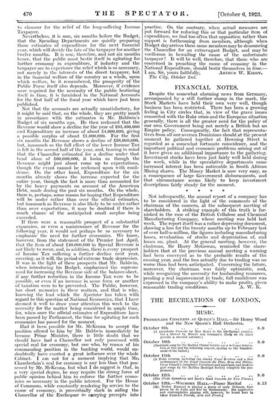FINANCE—PUBLIC & PRIVATE.
[By OUR CITY EDITOR.]
BUDGET PROSPECTS.
[To the Editor of the SPECTATOR.] SIR,-Six months hence, the public will be all agog concerning the Budget. To-day, scarcely anyone thinks about it or is concerned whether taxation will then be reduced or increased. We are so accustomed to live amidst the excitements of the moment that, with the Ruhr crisis and the Imperial Conference—to say nothing of the Beckett-Carpentier Fight—occupying attention, it is felt flat such .questions as. economy in expenditure and Budget prospects can well be left until the near approach of the Budget adds a spice of realism to the whole subject, and the daily newspapers will then begin (Continued on page 470.) to clamour for the relief of the long-suffering Income Taxpayer. Nevertheless, it is now, six months before the Budget, that the Spending Departments are quietly preparing those estimates of eXpenditure for the next financial year, which will decide the fate of the taxpayer for another twelve months. It is now, therefore, and not six months hence, that the public must bestir itself in agitating for further economy in expenditure, if industry and the taxpayer are to experience the relief which is so necessary, not merely in the interests of the direct taxpayer, but in the financial welfare of the country as a whole, upon which welfare, be it remembered, the prosperity of the Public Purse itself also depends. Moreover, if evidence were required for the necessity of the public bestirring itself in time, it is furnished in the National Accounts for the first half of the fiscal year which have just been published. Not that the accounts are actually unsatisfactory, for it might be said that, on the whole, they are pretty much in accordance with the estimates in Mr. Baldwin's Budget of six months ago. He then reckoned that the Revenue would show a decline for the year of £95,466,000 and Expenditure an increase of about £4,000,000, giving a possible surplus of about £1,000,000. For the first six months the Revenue shows a decline of £38,000,000, but, inasmuch as the full effect of the lower Income Tax is felt in the second half of the year, and, bearing in mind that the Chancellor estimated for a decline under that head alone of £60,000,000, it looks as though the Revenue might just about come up to expectations, though the event cannot be reckoned upon with confi- dence. On the other hand, Expenditure for the six months already shows the increase expected for the entire year, though the fact is more than accounted for by the heavy payments on account of the American Debt, made during the past six months. On the whole, there is, perhaps, some reason for hoping that.Expenditure will be under rather than over the official estimates, but inasmuch as Revenue is also likely to be under rather than over expectations, it may be doubted if there is much chance of the anticipated small surplus being exceeded.
If there were a reasonable prospect of a substantial expansion, or even a maintenance of Revenue for the following year, it would not perhaps be so necessary to emphasize the need for further economies. We know, however, from the statement of the Premier last April, that the item of about £40,000,000 in Special Revenue is not likely to recur, and, in addition, there is every prospect of Income Tax suffering a further decline next year, covering, as it will, the period of extreme trade depression. It was in the light of these prospects that Mr. Baldwin, when introducing his Budget, emphasized the supreme need for increasing the Revenue side of the balance-sheet, if any further reduction in the Income Tax were to be possible, or even if an increase in some form or another of taxation were to be prevented. The Public, however, has short memories in these matters, and that is why, knowing the lead which the Spectator has taken with regard to this question of National Economies, that I have deemed it well to draw your attention this week to the necessity for the matter being considered in ample time, for, when once the official estimates of Expenditure have been passed by Parliament, the time for agitating for such economies has passed for the moment. Had it been possible for Mr. McKenna to accept the position offered to him by Mr. Baldwin immediately he became Prime Minister, there is little doubt that we should have had a Chancellor not only possessed with special zeal for economy, but one who, by reason of his commanding position in the banking world, would un- doubtedly have exerted a great influence over the whole Cabinet. I am not for a moment implying that Mr, Chamberlain's zeal for economy is any less than that pos- sessed by Mr. McKenna, but what I do suggest is that, m a very special degree, he may require the strong force of public opinion behind him to enforce the further econo- mies so necessary in the public interest. For the House of Commons, while constantly rendering lip service to the cause of economy, is proverbially slack in aiding the Chancellor of the Exchequer in carrying precepts into practice. On the contrary, when actual measures are put forward for reducing this or that particular item of expenditure, we find too often that opposition rather than support is forthcoming from members, although when Budget day arrives these same members maybe denouncing the Chancellor for an extravagant Budget, and may be vociferous in bewailing the cause of the unfortunate taxpayer ! It will be well, therefore, that those who are concerned in preaching the cause of economy in the National Expenditure, should bestir themselves in time.—











































 Previous page
Previous page